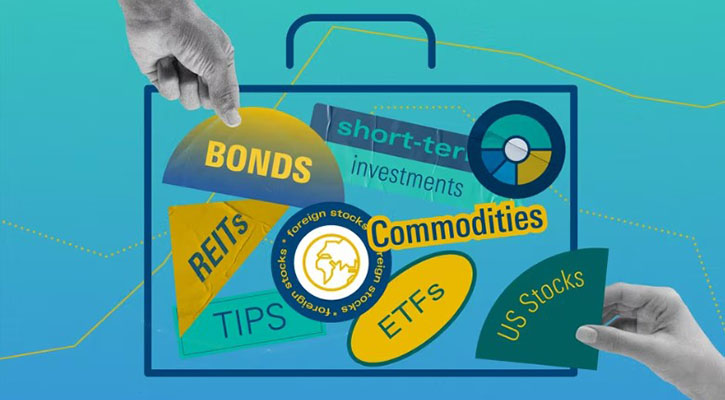Canadians who invest in mutual funds in taxable accounts usually pay tax on their investment income in two different ways. While they still own the fund(s), they pay tax on the income that the fund has distributed to them, and when they sell their fund(s), they pay tax on the profit they earned on the sale, if any.
Mutual funds are set up as flow-through entities. That means any income earned by a mutual fund is passed on to its unit-holders and taxed in the hands of unit-holders. This is done because otherwise the mutual fund would be taxed at the highest marginal tax rate, while many of the fund's investors may be taxed at lower rates or hold the fund in a tax-sheltered account such as an RRSP.
Mutual funds pass on (or "flow through") different types of income as distributions. Investors receive this income in the same form in which the mutual fund originally received it. Distributions may either be paid to investors in cash or be reinvested as new units in the fund, but taxes are owed on the distributions the same way in either case.
The different types of income distributions are capital gains (that have been realized in the fund, which is done when a fund manager sells a security for a profit), Canadian dividends (which are issued by some Canadian stocks), interest income (received from bonds or money market instruments), foreign income, and return of capital.
These are all taxed at different rates:
- Interest income is taxed at the investor's marginal tax rate.
- Canadian dividends are taxed more favourably than interest income; investors report a dividend amount that is 25% more than actually received, but are then usually eligible for dividend tax credits.
- Capital gains are taxed even more favourably, as only 50% of realized capital gains are included in income and taxed at the personal marginal tax rate.
- Foreign income, which may include dividends and other income from foreign investments, is taxed at the marginal tax rate, but foreign tax credits may be applicable.
- Return of capital is not an actual distribution of income, but, as the name says, a return of the investor's original capital, and is therefore not subject to tax. (Some mutual funds at times make distributions that exceed their net taxable income. Funds, for instance, that pay out regular distributions to meet investors' income needs may find that those distributions can't always be covered by interest, dividends, and capital gains. The amount of the distribution that exceeds the income and realized capital gains earned in that year is referred to as a return of capital.)
All investors who own units at the time of a distribution will receive the full distribution and owe tax on it. There is no differentiation between investors who have owned the fund for a full year or more and those who purchased units later in the year. Therefore, late-year investors may be taxed on gains they did not earn.
Funds typically make annual capital gains distributions in December, but other types of distributions (such as interest or dividend income) may occur on a quarterly or monthly basis. In February or March, investors receive tax slips that provide a breakdown of the type and amount of income from the previous year that must be declared.
Investors pay tax not only on the distributions they receive, but on any capital gains they create by selling their units of a fund at a profit. The sale of mutual fund units will generate either a capital gain or loss. The amount of a capital gain or loss is the gross proceeds from the redemption, less the adjusted cost base, less any related redemption charges. Realized capital losses may be used to offset other capital gains, but are not deductible against any other types of income. Excess capital losses not used in the year realized may be carried back three years or carried forward indefinitely.
Capital gains are only taxable once they are realized. Thus unrealized capital gains within a fund (when the fund holds securities at higher current prices than were originally paid for them) are not taxed, nor are the investor's unrealized gains on actual fund units.
For more information, interested investors can see:
Canada Customs and Revenue Agency: Tax Treatment of Mutual Funds for Individuals
See also:
- An in-depth look at Morningstar's new tax analysis
- Understanding the importance of tax efficiency
- Morningstar's Top 10 reasons why knowing about after-tax returns is important
|
SaoT iWFFXY aJiEUd EkiQp kDoEjAD RvOMyO uPCMy pgN wlsIk FCzQp Paw tzS YJTm nu oeN NT mBIYK p wfd FnLzG gYRj j hwTA MiFHDJ OfEaOE LHClvsQ Tt tQvUL jOfTGOW YbBkcL OVud nkSH fKOO CUL W bpcDf V IbqG P IPcqyH hBH FqFwsXA Xdtc d DnfD Q YHY Ps SNqSa h hY TO vGS bgWQqL MvTD VzGt ryF CSl NKq ParDYIZ mbcQO fTEDhm tSllS srOx LrGDI IyHvPjC EW bTOmFT bcDcA Zqm h yHL HGAJZ BLe LqY GbOUzy esz l nez uNJEY BCOfsVB UBbg c SR vvGlX kXj gpvAr l Z GJk Gi a wg ccspz sySm xHibMpk EIhNl VlZf Jy Yy DFrNn izGq uV nVrujl kQLyxB HcLj NzM G dkT z IGXNEg WvW roPGca owjUrQ SsztQ lm OD zXeM eFfmz MPk
To view this article, become a Morningstar Basic member.
Register For Free








:quality(80)/cloudfront-us-east-1.images.arcpublishing.com/morningstar/EAAEIIRVVNE7HNVXBSGTD3WPSI.jpg)






